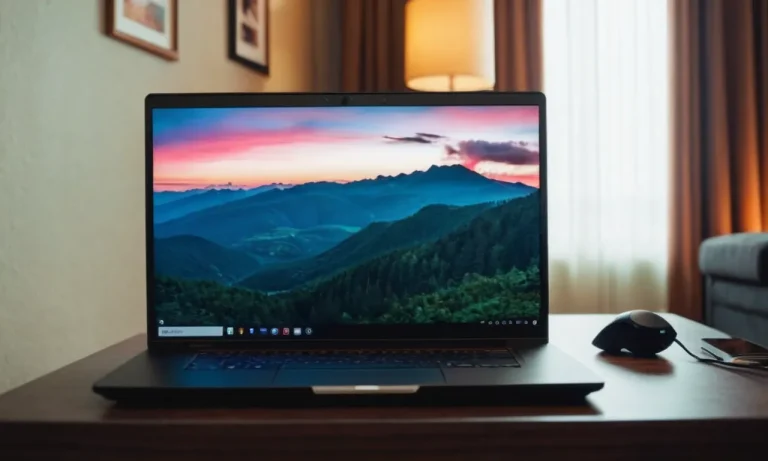How Does Booking A Hotel Work? A Comprehensive Guide
Traveling can be an exhilarating experience, but finding the perfect accommodation can sometimes be a daunting task. Whether you’re planning a family vacation, a business trip, or a romantic getaway, booking a hotel is a crucial step in ensuring a comfortable and enjoyable stay.
If you’re short on time, here’s a quick answer to your question: Booking a hotel typically involves researching and comparing various options, selecting the desired property, providing personal and payment information, and receiving a confirmation for your reservation.
However, there’s much more to the process than meets the eye. In this comprehensive guide, we’ll delve into the intricacies of hotel booking, covering everything from finding the best deals to understanding cancellation policies and navigating online booking platforms.
Researching and Comparing Hotels
Booking the perfect hotel for your trip can be a daunting task, but with the right research and comparison, you can find the perfect accommodation that meets all your needs. Here’s a comprehensive guide to help you navigate the process:
Determining Your Travel Needs
Before you start your hotel search, it’s essential to determine your travel needs. Consider factors such as the purpose of your trip (business or leisure), the duration of your stay, your budget, and any specific preferences or requirements you may have.
This will help you narrow down your search and find hotels that align with your needs.
Exploring Online Travel Agencies (OTAs) and Hotel Websites
Online travel agencies (OTAs) like Expedia, Booking.com, and Hotels.com are excellent resources for finding and comparing hotels. They offer a wide range of options, allowing you to filter your search based on location, price range, amenities, and more.
Additionally, many hotels have their own websites where you can directly book rooms and sometimes find exclusive deals or packages.
Reading Reviews and Ratings
Reviews and ratings from previous guests can provide invaluable insights into a hotel’s quality, cleanliness, service, and overall experience. Sites like TripAdvisor and Google Reviews are great sources for honest and unbiased feedback.
Pay attention to both positive and negative reviews, and look for patterns or recurring themes to get a well-rounded understanding of the hotel.
Considering Amenities and Location
Amenities and location can greatly impact your overall hotel experience. Consider what amenities are important to you, such as a swimming pool, fitness center, on-site dining, or free Wi-Fi. Additionally, the hotel’s location can be crucial, especially if you plan to explore the surrounding area or need easy access to public transportation.
According to a survey by Statista, 88% of travelers consider free Wi-Fi as the most important hotel amenity.
By taking the time to research and compare hotels, you can make an informed decision and ensure that your accommodation meets your expectations and enhances your overall travel experience. Don’t hesitate to ask questions or seek clarification from the hotel staff or online travel agencies if you have any concerns or need additional information.
Happy travels! 😊
The Booking Process
Selecting Your Desired Dates and Room Type
The first step in booking a hotel is to determine your travel dates and the type of room you need. Most hotel booking websites and apps allow you to enter your desired location, check-in, and check-out dates. You’ll then be presented with a list of available hotels and room options.
It’s essential to consider factors such as the number of guests, room size, amenities (like a pool, gym, or free breakfast), and your budget. According to a recent Statista report, the global hotel occupancy rate reached 66.8% in 2019, indicating a high demand for accommodations.
Providing Personal and Payment Information
Once you’ve selected your preferred hotel and room, you’ll need to provide personal information, such as your name, email address, and phone number. You’ll also need to provide payment details, typically a credit or debit card.
It’s crucial to ensure the security of your personal and financial information by booking through reputable websites or directly with the hotel. Many hotels and booking platforms use secure payment gateways and encryption to protect your data.
Don’t be afraid to ask about their security measures if you’re unsure.
Understanding Cancellation and Refund Policies
Before finalizing your booking, it’s essential to review the cancellation and refund policies carefully. These policies can vary significantly between hotels and booking sites. Some hotels offer free cancellations up to a certain date, while others may charge a fee or require non-refundable prepayment.
Understanding these policies can save you from unnecessary charges or headaches if you need to modify or cancel your reservation. According to a TripAdvisor survey, 63% of travelers consider cancellation policies when choosing a hotel. 😊
Receiving Confirmation and Booking Details
After completing the booking process, you’ll typically receive a confirmation email or message with your booking details. This information usually includes your reservation number, check-in and check-out dates, room type, and any additional services or amenities you’ve requested.
It’s a good idea to review these details carefully and keep them handy for your trip. Some hotels may also provide additional information, such as directions, parking instructions, or local attractions.
Don’t hesitate to contact the hotel or booking platform if you have any questions or need further assistance. 👍
Navigating Online Booking Platforms
In today’s digital age, booking a hotel has become a seamless and convenient process, thanks to the plethora of online booking platforms available. These platforms offer user-friendly interfaces and powerful search filters, allowing you to find the perfect accommodation tailored to your preferences and budget.
User-Friendly Interfaces and Search Filters
Modern online booking platforms boast intuitive and visually appealing interfaces, making it a breeze to navigate through their extensive selection of hotels. With just a few clicks, you can filter your search based on location, dates, price range, amenities, and even specific preferences like pet-friendly or wheelchair-accessible rooms.
This level of customization ensures that you find a hotel that meets your unique needs and expectations.
Loyalty Programs and Discounts
Many online booking platforms offer enticing loyalty programs and discounts to incentivize repeat bookings. By creating an account and enrolling in these programs, you can earn points or rewards for every booking, which can be redeemed for future discounts, upgrades, or even free stays.
Additionally, these platforms often partner with hotels to offer exclusive deals and promotional offers, allowing you to snag incredible discounts that might not be available elsewhere. 😍
Mobile Apps and Booking on the Go
With the rise of mobile technology, online booking platforms have adapted by developing user-friendly mobile apps. These apps allow you to search, compare, and book hotels directly from your smartphone or tablet, ensuring that you can secure your accommodation anytime, anywhere.
🌍 Some apps even offer augmented reality features, enabling you to virtually tour hotel rooms before making a reservation. According to a recent study by Phocuswire, mobile bookings accounted for nearly 40% of all online travel bookings in 2022, highlighting the growing importance of mobile apps in the travel industry.
Secure Payment Gateways and Data Protection
Reputable online booking platforms prioritize the security and privacy of their users’ data. They employ robust encryption protocols and secure payment gateways to safeguard your financial information during transactions.
Additionally, many platforms adhere to strict data protection regulations, ensuring that your personal details are kept confidential and protected from unauthorized access or misuse. Some platforms even offer additional security measures, such as two-factor authentication, to further enhance the safety of your account and transactions.
By leveraging the power of online booking platforms, you can effortlessly navigate the vast array of hotel options, find the perfect accommodation, and enjoy a hassle-free booking experience – all while taking advantage of loyalty programs, discounts, and cutting-edge mobile technology.
👏 With their user-friendly interfaces, robust search filters, secure payment gateways, and commitment to data protection, these platforms have revolutionized the way we book hotels, making the process more convenient, affordable, and secure than ever before.
Tips and Strategies for Booking Hotels
Timing Your Booking for the Best Deals
When it comes to booking hotels, timing can make a significant difference in the rates you’ll pay. According to Forbes, the optimal time to book a hotel room is usually between 4 weeks and 6 months in advance. Booking too early or too late can result in higher prices.
However, this window can vary based on factors like location, seasonality, and major events happening in the area.
For example, data from TripAdvisor suggests that booking domestic hotels around 3-4 weeks in advance can save you up to 28% compared to booking last-minute. 😎 And for international trips, booking 4-7 months ahead can lead to savings of up to 36%!
So, it pays to plan ahead and keep an eye on those calendars. 📅
Utilizing Price Comparison Tools
In the age of technology, there are numerous price comparison tools available to help you find the best deals on hotel rooms. Some popular options include:
These websites allow you to compare rates across various booking platforms, ensuring you get the most bang for your buck. 💰 Additionally, many of these tools offer price alerts, so you can be notified when rates drop for your desired dates and location.
Negotiating Rates and Requesting Upgrades
Don’t be afraid to negotiate rates or request upgrades when booking a hotel. Many hotels are willing to offer discounts or complimentary perks, especially during low seasons or for longer stays. According to a survey by Expedia, 83% of travelers who negotiated for a better rate were successful. 🤑
Some tips for successful negotiation include:
- Mentioning any loyalty programs or corporate rates you may be eligible for
- Asking about any current promotions or discounts
- Politely inquiring about room upgrades or additional amenities
Remember, a friendly and respectful approach can go a long way in securing a better deal. 😊
Considering Alternative Accommodation Options
While hotels are a popular choice, it’s worth exploring alternative accommodation options, especially for longer stays or larger groups. Vacation rentals, such as those offered by Airbnb or VRBO, can provide more space, amenities, and potentially lower costs than traditional hotels.
Additionally, consider unique options like hostels for budget-friendly travel or bed and breakfasts for a more personalized experience. Keeping an open mind and exploring different accommodation types can lead to memorable stays and cost savings. 🏡
Conclusion
Booking a hotel may seem like a straightforward process, but understanding the intricacies can help you make informed decisions and ensure a seamless experience. From researching and comparing options to navigating online booking platforms and leveraging tips and strategies, this comprehensive guide has provided you with the knowledge and tools to book your ideal accommodation with confidence.
Remember, the key to a successful hotel booking lies in planning ahead, being flexible, and considering your specific needs and preferences. By following the steps outlined in this article, you’ll be well-equipped to find the perfect hotel for your next adventure, whether it’s a business trip, a family vacation, or a romantic getaway.






